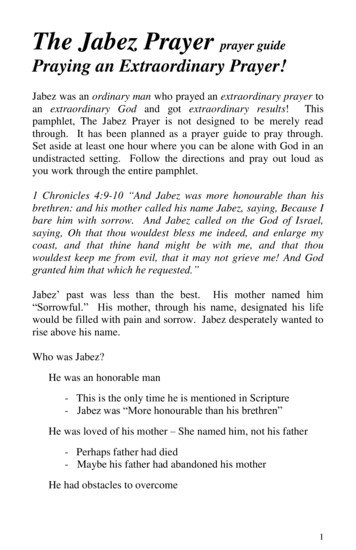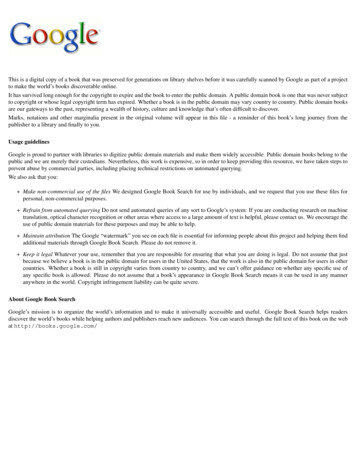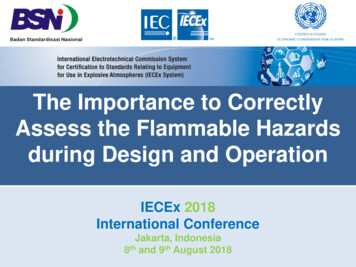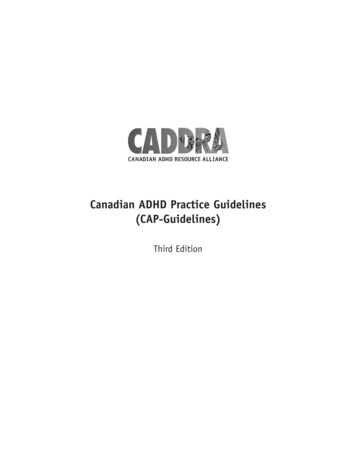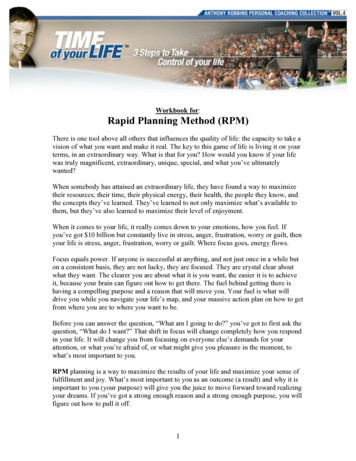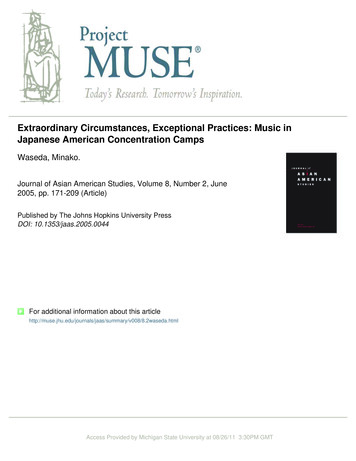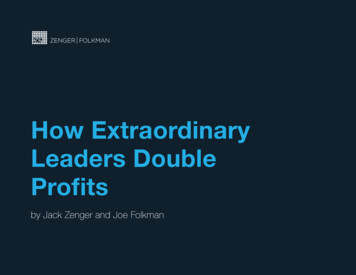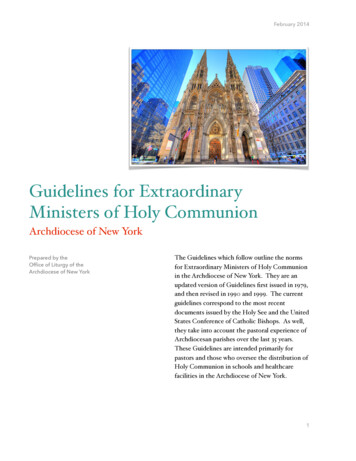
Transcription
February 2014Guidelines for ExtraordinaryMinisters of Holy CommunionArchdiocese of New YorkPrepared by theOffice of Liturgy of theArchdiocese of New YorkThe Guidelines which follow outline the normsfor Extraordinary Ministers of Holy Communionin the Archdiocese of New York. They are anupdated version of Guidelines first issued in 1979,and then revised in 1990 and 1999. The currentguidelines correspond to the most recentdocuments issued by the Holy See and the UnitedStates Conference of Catholic Bishops. As well,they take into account the pastoral experience ofArchdiocesan parishes over the last 35 years.These Guidelines are intended primarily forpastors and those who oversee the distribution ofHoly Communion in schools and healthcarefacilities in the Archdiocese of New York.1
February 2014IntroductionThe proof of his boundless charity that Christ the Lordleft to his Bride the Church, namely, the inexpressibleand supreme gift of the Eucharist, requires us to deepenour appreciation of this great mystery and to share evermore fully in its saving power. The new conditions ofthe present seem to demand that, without prejudice tothe supreme reverence due to so great a sacrament, accessto communion be made easier, so that by sharing morefully in the effects of the sacrifice of the Mass, thefaithful may more willingly and intensely givethemselves to God and to the good of the Church and ofall humanity. Immensae Caritatis, Introduction.With these words, the Church opens herInstruction which permits lay men and women toassist with the distribution of Holy Communion.This permission extends from the Church's desireto make the Eucharist more readily available tothe faithful.In March of 1971, the National Conference ofCatholic Bishops received permission from Rometo introduce the practice of lay ministers of HolyCommunion in the United States. On March 11,1973, Cardinal Cooke inaugurated this practice atSt. Patrick's Cathedral, where he commissioned agroup of lay men and women to assist with thedistribution of the Holy Communion at Mass intheir parishes. Since that time, the service ofExtraordinary Ministers of Holy Communion inthe Archdiocese has been extended to includebringing Holy Communion to the sick in theirhomes and in healthcare facilities.2
February 2014Ordinary and Extraordinary Ministersof Holy CommunionOrdinary Ministers of Holy Communion are bishops, priests, and deacons. These personsdistribute Holy Communion by virtue of their ordination. "It is first of all the office of the priestand the deacon to minister Holy Communion to the faithful who ask to receive it. It is mostfitting, therefore, that they give a suitable part of their time to this ministry of their order,depending on the needs of the faithful" (Holy Communion and Worship of the Eucharist Outisde Mass,17).Under certain circumstances, lay men and women may be delegated to distribute HolyCommunion by a bishop (or a priest, on a single occasion). These persons are known as"Extraordinary Ministers of Holy Communion". Instituted acolytes (usually seminarians andcandidates for the permanent diaconate) become Extraordinary Ministers through theirinstitution. The role of the Extraordinary Minister of Holy Communion does not replace thatof the Ordinary Minister, but supplements it on a provisional basis (Redemptionis Sacramentum,151). That is, when a sufficient number of Ordinary Ministers is present for the distribution ofHoly Communion, Extraordinary Ministers of Holy Communion should not serve.The term "Minister of the Eucharist” refers to those who confect the Sacrament of the Eucharistin persona Christi (Redemptionis Sacramentum, 154; CIC, 900). As such, it applies only to bishopsand priests.3
February 2014Pastoral ProcedureDetermination of the need for Extraordinary Ministers of Holy Communion should be made bythe pastor of a parish. In a school or healthcare facility, this decision is made by the Catholicchaplain, in consultation with the local dean. Two areas of need should be considered:a. that of facilitating distribution of Holy Communion at Mass on Sundays and weekdaysso that the communion rite does not become unduly prolonged;b. that of providing Holy Communion on a regular basis, especially from Sunday Mass,for the sick and those confined to their homes or to institutions within the parish.Need for ExtraordinaryMinisters of HolyCommunion at MassThe Instruction RedemptionisSacramentum states thatExtraordinary Ministers of HolyCommunion may be used duringMass when a "Priest and Deaconare lacking, when the Priest isprevented by weakness oradvanced age or some othergenuine reason, or when thenumber of faithful coming to Communion is so great that the very celebration of Mass would beunduly prolonged" (158). In these cases, it is appropriate for Extraordinary Ministers of HolyCommunion to be employed. Extraordinary Ministers of Holy Communion should not serve ifthere will otherwise be only a brief prolongation of the Mass (Redemptionis Sacramentum, 158).Extraordinary Ministers of Holy Communion may be asked to assist in the distribution of thePrecious Blood. When this takes place, "their number should not be increased beyond what isrequired for the orderly and reverent distribution of the Body and Blood of the Lord" (Norms forthe Distribution and Reception of Holy Communion Under Both Kinds in the Dioceses of the United States ofAmerica, 28). The Bishops of the United States also note that, "in practice, the need to avoidobscuring the role of the priest and the deacon as the Ordinary Ministers of Holy Communionby an excessive use of Extraordinary Ministers might in some circumstances constitute a reasoneither for limiting the distribution of Holy Communion under both species or for usingintinction instead of distributing the Precious Blood from the chalice" (Norms, 24).4
February 2014Need for Extraordinary Ministersto Bring Holy Communion to theSick at Home or in HealthcareFacilitiesThe Pastoral Care of the Sick directs pastors toprovide for the frequent reception of HolyCommunion by the sick and aged (72). Theseindividuals have the right to periodic visits bypriests, who, in addition to bringing HolyCommunion, can offer the sacraments ofPenance and Anointing of the Sick, and bringadded comfort and spiritual assistance.Extraordinary Ministers of Holy Communionmay be asked to assist the priests and deaconsof a parish in their service to the sick andhomebound. This need for ExtraordinaryMinisters of Holy Communion can arisewhen distance "makes it difficult to bringcommunion, especially as viaticum to the sickin danger of death; or when the sheer numberof sick people, especially in hospitals or similar institutions, requires several ministers" (ImmensaeCaritatis, I).It is particularly appropriate that Holy Communion be brought to the sick from Sunday Mass(see Pastoral Care of the Sick, 73). Sunday, however, is a day on which the pastoral ministry ofpriests and deacons can make it difficult for them to bring Holy Communion to the sick at homeor to healthcare facilities. Extraordinary Ministers of Holy Communion may be employed inthese circumstances as well.5
February 2014Becoming anExtraordinary Minister of Holy CommunionBecoming an Extraordinary Minister of Holy Communion includes four elements of preparation: Selection Formation Mandating by the Dean CommissionSELECTIONThose who are selected to be Extraordinary Ministers of Holy Communion must: be at least 18 years old; be a Catholic who has received First Communion and Confirmation and who leads alife of faith in keeping with the function to be assumed; not be bound by any canonical penalty legitimately imposed or declared; be reverential, respectful of his or her faith and the Blessed Sacrament, and of goodmoral character; if married, must be in a valid marriage according to the law of the Catholic Church.Special care should be exercised in the choice of Extraordinary Ministers who will bring HolyCommunion to the sick. These individuals should be able to minister to the sick in acompassionate, prayerful, and sensitive way. They should possess psychological maturity and theability to keep confidences, not discussing indiscriminately the condition of patients or theirhomes.FORMATION OFEXTRAORDINARY MINISTERS OF HOLY COMMUNIONResponsibilityThe Archdiocese requires that a person participate in a program of formation before beingmandated as an Extraordinary Minister of Holy Communion. This program is usually conductedby the parish where the Minister will serve. Topics covered should include:6
February 2014 theology of the Eucharist theology of ministry pastoral/liturgical considerations with emphasis on familiarity with the pertinent ritualsThe Office of Liturgy offers training videos for Extraordinary Ministers of Holy Communion inboth English and Spanish. Parishes that would like to obtain copies of these videos may do so bycontacting the Office of Liturgy or by accessing them on the Office’s webpage (nyliturgy.org).Continuing formationIt is appropriate that opportunities for Extraordinary Ministers of Holy Communion to increasetheir knowledge of eucharistic theology and their devotion to the Eucharist be provided by theparish or institution on a yearly basis. These opportunities could include afternoon or eveningsof recollection with a lecture or reflection on some aspect of eucharistic theology or spirituality.Exposition and Benediction of the Blessed Sacrament with prayer may be provided. It may alsobe helpful for Extraordinary Ministers of Holy Communion to meet from time to time with apriest or deacon from their parish to discuss their service, and to obtain advice with regard todifficult situations which they have encountered.MANDATING BY THE DEANThe MandateThe mandate is a written statement from a dean certifying that a person has completed therequired preparatory course, and may function as an Extraordinary Minister of HolyCommunion in a designated parish, school, or healthcare facility. The mandate is nontransferrable (i.e., one who is mandated for service in one parish or institution is not necessarilymandated to serve in other parishes or institutions). The mandate for Extraordinary Ministers ofHoly Communion is given by the dean in the area where the parish, school, or facility is located.Mandating forms may be obtained by the dean from the Archdiocesan Office of Liturgy andshould be sent by the dean directly to the parish or institution where the Extraordinary Ministerof Holy Communion will serve. The institution then presents the mandate to the ExtraordinaryMinister of Holy Communion.Application for MandateThe following procedure should be followed when applying for a mandate: A written request naming those to be mandated, and signed by the pastor or chaplain,should be made to the dean after the candidates have completed the formation programoutlined above;7
February 2014 This request should indicate the term of service (usually three years);If the person is being selected as an Extraordinary Minister of Holy Communion for aschool or healthcare facility, a letter of approval from the pastor of the parish towhich that person belongs should be submitted with the mandate request for thatperson.Terms for Extraordinary Ministers of Holy CommunionThe mandate to serve as an Extraordinary Minister of Holy Communion is, in most cases, givenfor a term of three years. The mandate may be renewed for additional terms. This practice hascertain advantages: It encourages turnover among such ministers, ensuring that no individual feels that he orshe has a monopoly on this ministry, and giving other qualified parishioners theopportunity to serve; It prevents the situation wherein individuals may be called to indefinitely sacrifice theirown personal time for this service; It ensures as a matter of course the option to review the ExtraordinaryMinisters of Holy Communion in a parish or institution, and makes it less difficult to endthe service of those who may be less well suited to this role.It is possible that Extraordinary Ministers of Holy Communion might serve one or more terms,take time away from this service, and then later return to it.Termination of MandateThe mandate of Extraordinary Ministers of Holy Communion in the Archdiocese of New Yorkautomatically terminates if the person moves from the parish or institution for which he or shewas mandated. As well, the mandate can be ended at any time by the dean in consultation withthe local pastor, or by the pastor himself for good reason.Renewing the Mandate of Extraordinary Ministers of Holy CommunionWhen people who have formerly served as Extraordinary Ministers of Holy Communion returnto this ministry, it is necessary for them to receive a new mandate from the dean. Whilepreparation for this new mandate need not take the form of attending an initial instructionalseminar, it should include the following instruction by a priest or deacon: Instruction about elements of the ministry which have changed since the person wasoriginally prepared as an Extraordinary Minister of Holy Communion; Brief review of the standard elements of the training program; Consideration of procedures specific to the parish or institution.8
February 2014Extraordinary Ministers of Holy Communion in Religious CongregationsThe mandating of religious sisters and brothers as Extraordinary Ministers of Holy Communionin their religious houses is done by the Vicar for Religious in the Archdiocese. This mandatedoes not automatically carry over to parishes, health care facilities or schools. Separate mandatesshould be requested for service in these institutions. The norms for the use of ExtraordinaryMinisters of Holy Communion apply to Masses celebrated in chapels or houses of religious, aswell as to their parishes, schools, and other facilities. When a sufficient number of OrdinaryMinisters are present, Extraordinary Ministers of Holy Communion should not serve.COMMISSIONING OFEXTRAORDINARY MINISTERS OF HOLY COMMUNIONIn the Archdiocese of New York, new and returning Extraordinary Ministers of HolyCommunion are commissioned by the dean according to a Rite of Commission (Book of Blessings,Ch. 63). This Commissioning will normally take place once a year per deanery. This ceremonyserves to mark the beginning of the ministry of the individuals commissioned. Service as anExtraordinary Minister of Holy Communion may begin, however, as soon as the mandate isreceived, even if this takes place before the commissioning ceremony. The ceremony ofcommissioning must never resemble Sacred Ordination in any way (Redemptionis Sacramentum,155).Temporary Commissioning of Extraordinary Ministers of Holy CommunionWhile formal mandating by the dean after proper preparation is the normal way in which aperson becomes an Extraordinary Minister of Holy Communion, it is permissible for a priest toappoint such a minister to serve on a single occasion, when there is real necessity. Necessity inthis instance should be understood as a situation which arises suddenly and without warning (e.g.,larger number of people than usual at a given Mass and no formally mandated ExtraordinaryMinisters of Holy Communion present). It does not extend to situations in which there issimply a desire to allow individuals who have not been mandated to exercise this ministry at aspecific ceremony (e.g., a bride and groom at their wedding; family members at a funeral). Inthese and other similar instances when Extraordinary Ministers must be used, persons who havebeen mandated for that institution and commissioned by the normal process should beemployed.When there is need for a temporary commissioning, the person should be publicly commissionedaccording to the Rite found in Appendix III of the Roman Missal. Ministers commissioned inthis way may serve only on the occasion on which they have been commissioned.9
February 2014Extraordinary Ministers of Holy Communion:Overview of MinistryThe Extraordinary Minister of Holy Communion at MassWhen Extraordinary Ministers of Holy Communion are employed at Mass, the followingprocedures should be followed (see Norms For The Distribution And Reception Of Holy CommunionUnder Both Kinds In The Dioceses Of The United States Of America):1. Extraordinary Ministers of Holy Communion should not form a part of the entranceprocession or recessional. However, they should be seated in a location close to the sanctuary, soas to facilitate their ministry. No special vesture is necessary for an Extraordinary Minister ofHoly Communion. However, they should be dressed in a dignified manner which befits theirservice. "It is never licit for laypersons to assume the role or the vesture of a Priest or a Deaconor other clothing similar to such vesture" (Redemptionis Sacramentum, 153).2. If needed, the Extraordinary Minister of Holy Communion should approach the altarafter the priest has received Holy Communion. After the priest distributes Holy Communion tothe deacon and Extraordinary Ministers of Holy Communion, he then hands the vesselscontaining the Body and Blood of the Lord to those who will assist in the distribution of HolyCommunion. The deacon may assist in the distribution of these vessels.3. The ministers of Holy Communion then proceed to their assigned places to distributecommunion to the faithful. The ritual formulas "The Body of Christ" and "The Blood of Christ"should be used, with no alterations or additions. The decision to receive the host on the tongueor in the hand is made by the communicant, and not the minister (General Instruction of the RomanMissal, 161). "However, special care should be taken to ensure that the host is consumed by thecommunicant in the presence of the minister, so that no one goes away carrying the Eucharisticspecies in his hand" (Redemptionis Sacramentum, 92).When distributing the Precious Blood, ministers should allow the communicant to takethe chalice into his or her own hands, and then wipe and turn the chalice after eachcommunicant has received the Precious Blood. At the conclusion of the distribution of HolyCommunion, Extraordinary Ministers of Holy Communion who assist with the chalice mayconsume any remaining Precious Blood.4. Once the distribution of Holy Communion has ended, all ministers should return tothe altar or credence table with their vessels, either placing them on the corporal, or handingthem to a priest or deacon. Those who have participated in distributing hosts may wish to purifytheir fingers of any particles that may have clung to them by wiping their fingers over theciborium. Additionally, a small bowl of water may be provided at the credence table or next tothe tabernacle for this purpose (General Instruction of the Roman Missal, 278).10
February 20145. Once they have deposited their vessels, Extraordinary Ministers of Holy Communionreturn to their seats. Extraordinary Ministers of Holy Communion may not assist in thepurification of the vessels, unless they are instituted acolytes (e.g. seminarians or candidates forthe permanent diaconate).6. If a person is involved in more than one ministry, they should ordinarily serve in onlyone of these ministries at any given celebration (e.g., should not serve both as lector and anExtraordinary Minister of Holy Communion at the same Mass).7. An Extraordinary Minister of Holy Communion may minister both at Mass and tothose at home or in a health care facility, provided he or she is properly qualified and prepared foreach role.Ministering to the Sick and HomeboundWhen Extraordinary Ministers of Holy Communion are sent from a parish to the home of thesick or a health care institution, the following procedures should be followed:1. The Extraordinary Minister of Holy Communion should be provided by the parish orinstitution with a pyx in which to carry the Eucharist, as well as a copy of the Rite of Communionof the Sick.2. A priest or other custodian of the key to the tabernacle should place the requirednumber of hosts into the pyx for the Extraordinary Minister of Holy Communion. If this takesplace during Mass, the Extraordinary Minister of Holy Communion should remain for the finalblessing. No special rite of sending forth is necessary.Extraordinary Ministers of Holy Communion should not come forward with their pyxesduring the Communion procession at Mass, as the one distributing Holy Communion may notbe familiar with those who are mandated as Extraordinary Ministers of Holy Communion.3. The Extraordinary Minister of Holy Communion should proceed directly to the homeor healthcare facility, without any extraneous stops to run errands, etc. (CIC, 935). The journeyfrom the church to the sick should be considered a time of prayer. If the Extraordinary Ministerof Holy Communion travels by car, it is appropriate to refrain from listening to the radio andunnecessary telephone conversations while carrying the Eucharist.4. Those who are with the sick should be asked to prepare a suitable table, covered with acloth. Candles are also to be provided, except in cases where an open flame is prohibited. Αvessel of holy water may also be prepared. (Pastoral Care of the Sick, 74)5. After arriving at the location, the Extraordinary Minister of Holy Communion shouldgreet the sick person and any friends or family members in a warm and friendly manner. TheExtraordinary Minister of Holy Communion should be knowledgeable as to when the Ordinary11
February 2014Rite of Communion to the Sick is appropriate (e.g., in communal celebrations in healthcare facilities;in private homes; where possible with individual patients in hospitals or nursing homes), andwhen the shorter Rite of Communion in a Hospital or Institution should be used (e.g., when theperson receiving the Eucharist would find it difficult to participate in a prolonged rite or whenthe number of individuals to be visited is many).6. At the conclusion of the Rite, the Extraordinary Minister should assure the sick personand those also gathered of the prayers of the community. After taking leave of the sick person,the Extraordinary Minister of Holy Communion should immediately return any hosts whichremain to the church or institution from which the Extraordinary Minister of Holy Communionwas sent. If this is not possible, the remaining hosts should be consumed by the ExtraordinaryMinister of Holy Communion. The pyx should be purified, either by an Ordinary orExtraordinary Minister of Holy Communion (Holy Communion and Worship of the Eucharist OutsideMass, 62).Exposition and Reposition of the Blessed Sacrament by Extraordinary Ministers ofHoly CommunionThe Rite of Eucharistic Exposition and Benediction permits the exposition and reposition ofthe Blessed Sacrament by an Extraordinary Minister of Holy Communion if an OrdinaryMinister is unable to do so. "Such ministers may open the tabernacle and also, if suitable, placethe ciborium on the altar or place the host in the monstrance. At the end of the period ofadoration, they may replace the Blessed Sacrament in the tabernacle. It is not lawful, however,for them to give the blessing with the Sacrament" (Holy Communion and Worship of the EucharistOutside Mass, 91). While Extraordinary Ministers of Holy Communion who expose or repose theBlessed Sacrament do not wear the liturgical vesture proper to the priest or deacon, they shoulddress in a manner which befits the dignity of this ministry.Rite of Distribution of Holy Communion Outside MassThe Rite of Distributing Holy Communion Outside Mass may be used when a priest is notavailable to celebrate Mass in a parish. When this occurs, a deacon or instituted acolyte may becalled on by the pastor to conduct this service. In their absence, an Extraordinary Minister ofHoly Communion may also be asked to lead this Rite. In these cases, the norms of the Riteshould be followed.12
February 2014Questions and Answers ConcerningExtraordinary Ministers of Holy Communion1. May an Extraordinary Minister of Holy Communion go to the tabernacle?In the celebration of Mass, a priest or deacon goes to the tabernacle (General Instructionof the Roman Missal, 163; Ceremonial of Bishops, 165).When an Extraordinary Minister of Holy Communion is asked to expose and repose theBlessed Sacrament, or lead a service of Holy Communion outside of Mass, they mayretrieve the Eucharist from the tabernacle (Holy Communion and Worship of the EucharistOutside Mass, 91; 30).When bringing Holy Communion to the sick, a priest or other custodian of the key to thetabernacle should place the needed number of hosts in a pyx for the ExtraordinaryMinister of Holy Communion (see Holy Communion and Worship of the Eucharist OutsideMass, 10).2. May an Extraordinary Minister of Holy Communion bring the BlessedSacrament home and reserve it there for a time later that day or later in theweek when he or she will bring Holy Communion to another sick person?No. It is never permissible for an Extraordinary Minister of Holy Communion to bring theBlessed Sacrament home, except for the purpose of administering Holy Communion tothe sick at that location.3. What is the eucharistic fast required for a sick person?The eucharistic fast for a sick person is fifteen minutes, if possible (Immensae Caritatis, III).If, for any reason, this is not possible, no fast is required. The fast of fifteen minutes alsoapplies to Roman Catholic family members or health attendants who are properlydisposed and who wish to receive Holy Communion with the person to whom thesacrament is being brought.13
February 20144. Can the Precious Blood be reserved and given to a sick person?Yes. "Sick people who are unable to receive communion under the form of bread mayreceive it under the form of wine alone. If the wine is consecrated at a Mass notcelebrated in the presence of the sick person, the blood of the Lord is kept in a properlycovered vessel and is placed in the tabernacle after communion. The Precious Bloodshould be carried to the sick in a vessel which is closed in such a way as to eliminate alldanger of spilling. If some of the Precious Blood remains, it should be consumed by theminister, who should also see to it that the vessel is properly purified" (Pastoral Care of theSick, 74).5. What is the proper procedure to follow when a sick person is unable toconsume the host?If a sick person is unable to consume an entire small host, a smaller piece may be given tothem. A glass of water may be provided to assist the sick person in consuming the host.If the host is rejected, it should be wrapped in a purificator, and brought to the church orchapel from which the Extraordinary Minister of Holy Communion was sent. There, a priestor deacon should dissolve the host in a small bowl of water. Once dissolved, this watershould be poured down the sacrarium.6. Who may purify the communion vessels at Mass?The most recent legislation states that only priests, deacons, and instituted acolytes (e.g.,seminarians and candidates for the permanent diaconate) may purify the communionvessels (General Instruction of the Roman Missal, 279). This may occur after thedistribution of Holy Communion. Alternatively, vessels which need to be purified may beleft on a corporal and covered, either on the altar or credence table, and then purifiedimmediately after Mass (General Instruction of the Roman Missal, 163).7. May an Extraordinary Minister of Holy Communion consume any remainingPrecious Blood at the conclusion of the distribution of Holy Communion?Yes. In the Archdiocese of New York, an Extraordinary Minister of Holy Communion maydirectly consume any Precious Blood which remains at the conclusion of the distribution ofHoly Communion. Under no circumstances should remaining Precious Blood be poured14
February 2014into the sacrarium (Redemptionis Sacramentum, 107). The consumption of remainingPrecious Blood should be done reverently, at the altar or credence table, but never whilewalking back to the sanctuary.8. Is it proper for the celebrant to give the host to the Extraordinary Ministerof Holy Communion before his own communion at Mass?No. Extraordinary Ministers of Holy Communion should receive Holy Communion afterthe celebrant has received the Eucharist.9. Is it proper for an Extraordinary Minister of Holy Communion to approachthe sanctuary during the Agnus Dei?No. Extraordinary Ministers of Holy Communion should not approach the sanctuary untilafter the celebrant has received Holy Communion.10. Is it proper for an Extraordinary Minister of Holy Communion to go to thealtar and give Communion to themselves?No. The Eucharist should always be ministered to, not picked up and received byindividual communicants (General Instruction of the Roman Missal, 160).11. May an Extraordinary Minister of Holy Communion assist with thebreaking of the Eucharistic host?No. The fraction of the Eucharistic host is performed by a priest, with the assistance of apriest or a deacon, when required (General Instruction of the Roman Missal, 240).12. Should an Extraordinary Minister of Holy Communion give a blessing toone who comes forward in the Communion procession, but who does notwish to receive the Eucharist?No. In this case, an Extraordinary Minister of Holy Communion should direct the individualwho wishes to receive a blessing to the nearest priest or deacon. In general, the practiceof giving blessings in the course of distributing Holy Communion is discouraged (see15
February 2014Congregation for Divine Worship and Discipline of the Sacraments, Protocol No. 930/08/L).13. What is the proper procedure to follow when a host is dropped or thePrecious Blood is spilled?"If a host or any particle should fall, it is to be picked up reverently; and if any of thePrecious Blood is spilled, the area where the spill occurred should be washed with water,and this water should then be poured into the sacrarium in the sacristy" (GeneralInstruction of the Roman Missal, 280).14. May Holy Communion be give
a. that of facilitating distribution of Holy Communion at Mass on Sundays and weekdays so that the communion rite does not become unduly prolonged; b. that of providing Holy Communion on a regular basis, especially from Sunday Mass, for the sick and those confined to their homes or to institutions within the parish. Need for Extraordinary
